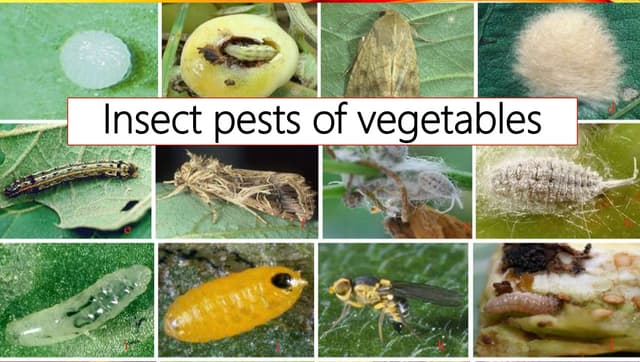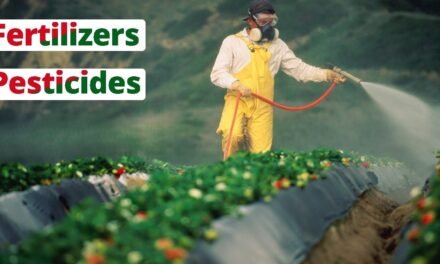Vegetable crops are vulnerable to various pests that can cause significant damage to yields and quality. Effective pest management involves identifying the pests, understanding their life cycles, and implementing integrated pest management (IPM) strategies. Here are the major pests affecting vegetable crops and their management practices:
1. Aphids
- Crops Affected: Tomatoes, cucumbers, peppers, leafy greens, and brassicas.
- Damage:
- Suck plant sap, causing stunted growth, curling leaves, and reduced yields.
- Secrete honeydew, leading to sooty mold and acting as vectors for viral diseases.
- Management:
- Cultural: Remove weeds and infected plant debris to eliminate habitats.
- Biological: Introduce natural predators like ladybugs and lacewings.
- Mechanical: Use water sprays to dislodge aphids from plants.
- Chemical: Apply neem oil or insecticidal soaps for severe infestations.
2. Whiteflies
- Crops Affected: Tomatoes, cucumbers, eggplants, and peppers.
- Damage:
- Suck plant sap, causing yellowing and leaf drop.
- Transmit viral diseases like tomato yellow leaf curl virus (TYLCV).
- Management:
- Cultural: Use reflective mulches to deter whiteflies.
- Mechanical: Install yellow sticky traps to monitor and reduce populations.
- Biological: Introduce parasitoids like Encarsia formosa.
- Chemical: Apply botanical insecticides like pyrethrum or organic-approved pesticides.
3. Thrips
- Crops Affected: Onions, garlic, tomatoes, peppers, and cucumbers.
- Damage:
- Feed on leaves, flowers, and fruits, causing silver streaks, scarring, and deformities.
- Transmit viral diseases like tomato spotted wilt virus (TSWV).
- Management:
- Cultural: Rotate crops to disrupt thrip life cycles.
- Mechanical: Use blue sticky traps to attract and capture thrips.
- Biological: Release predatory mites (Amblyseius swirskii).
- Chemical: Apply spinosad or neem-based products as a targeted spray.
4. Cabbage Loopers
- Crops Affected: Cabbage, broccoli, cauliflower, kale, and spinach.
- Damage:
- Larvae feed on leaves, leaving large holes and reducing photosynthesis.
- Management:
- Cultural: Remove plant debris and weeds to reduce breeding sites.
- Biological: Release parasitoid wasps like Trichogramma.
- Mechanical: Hand-pick caterpillars during early infestation.
- Chemical: Use Bacillus thuringiensis (Bt) as a safe and effective bio-insecticide.
5. Cutworms
- Crops Affected: Tomatoes, peppers, eggplants, and cucumbers.
- Damage:
- Larvae cut young seedlings at the base, causing plant death.
- Management:
- Cultural: Use collars around seedlings to prevent larvae access.
- Biological: Encourage predators like ground beetles and birds.
- Mechanical: Remove larvae by hand during early morning hours.
- Chemical: Apply soil-applied insecticides if infestations are severe.
6. Spider Mites
- Crops Affected: Tomatoes, peppers, eggplants, and cucumbers.
- Damage:
- Feed on leaf sap, causing stippling, bronzing, and webbing.
- Severe infestations lead to defoliation and reduced yields.
- Management:
- Cultural: Avoid water stress, as dry conditions favor spider mites.
- Biological: Release predatory mites like Phytoseiulus persimilis.
- Mechanical: Use strong water sprays to knock off mites.
- Chemical: Apply horticultural oils or sulfur-based sprays.
7. Leaf Miners
- Crops Affected: Spinach, lettuce, tomatoes, peppers, and onions.
- Damage:
- Larvae tunnel inside leaves, creating serpentine mines and reducing photosynthesis.
- Management:
- Cultural: Remove and destroy infested leaves to reduce populations.
- Biological: Use parasitoid wasps like Diglyphus isaea.
- Mechanical: Use sticky traps to monitor adult activity.
- Chemical: Apply neem oil or spinosad for control.
8. Armyworms
- Crops Affected: Corn, tomatoes, peppers, and leafy greens.
- Damage:
- Larvae feed on foliage, stems, and fruits, leading to extensive defoliation.
- Management:
- Cultural: Use pheromone traps to monitor and control adult moths.
- Biological: Release predators like lacewings or parasitic wasps.
- Mechanical: Remove larvae by hand when detected early.
- Chemical: Apply Bacillus thuringiensis (Bt) or other bio-insecticides.
9. Flea Beetles
- Crops Affected: Eggplants, peppers, tomatoes, radishes, and leafy greens.
- Damage:
- Adults chew small holes in leaves, creating a “shotgun” appearance.
- Severe infestations stunt plant growth.
- Management:
- Cultural: Use floating row covers to protect young plants.
- Biological: Encourage predators like ladybugs and birds.
- Mechanical: Apply sticky traps or diatomaceous earth around plants.
- Chemical: Use neem oil or pyrethrum-based sprays for control.
10. Root-Knot Nematodes
- Crops Affected: Tomatoes, carrots, cucumbers, and lettuce.
- Damage:
- Nematodes form galls on roots, reducing nutrient uptake and stunting growth.
- Management:
- Cultural: Rotate crops with non-host plants like onions or marigolds.
- Biological: Apply beneficial nematodes (Steinernema spp.) to reduce populations.
- Soil Treatment: Use solarization to kill nematodes before planting.
11. Slugs and Snails
- Crops Affected: Leafy greens, strawberries, and cucumbers.
- Damage:
- Feed on leaves and fruits, leaving slime trails and irregular holes.
- Management:
- Cultural: Remove debris and maintain dry conditions to deter slugs.
- Mechanical: Use beer traps or hand-pick slugs at night.
- Barrier Methods: Apply copper tape or diatomaceous earth around plants.
Integrated Pest Management (IPM) Principles
- Monitoring:
- Regularly inspect crops for signs of pests and damage.
- Cultural Controls:
- Maintain crop rotation, remove weeds, and use resistant varieties.
- Biological Controls:
- Introduce natural predators and beneficial organisms.
- Mechanical Controls:
- Use traps, hand removal, or barriers.
- Chemical Controls (Last Resort):
- Use organic and eco-friendly pesticides like neem oil, Bt, or spinosad.
Conclusion
Major pests affecting vegetable crops can be effectively managed by adopting an integrated approach that combines cultural, biological, mechanical, and chemical methods. Regular monitoring and early intervention are key to minimizing damage and maintaining healthy, productive vegetable crops.
Hashtags
#NaturalPestControl #GreenFarming #PesticideFree #HealthyHarvest #EcoPestControl #FarmersAgainstPests #ProtectYourCrops #PestResistantPlants #EnvironmentallyFriendly #PestFreeZone #SustainablePestControl #OrganicPestManagement #HealthySoil #IntegratedCropProtection #EcoFriendlyFarming #PestManagementStrategies #SustainablePesticides #EcoConsciousFarming #PestFreeEnvironment #SustainablePestPrevention









